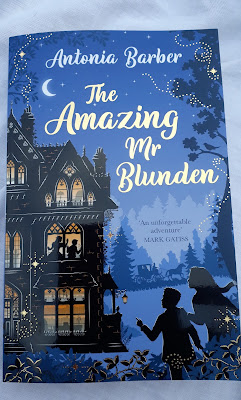A blackbird was calling, a single note repeated, a warning note; but she could not turn her head to look at him. It was as if she were concentrating all her mind upon one thing but against her will. And upon something she did not understand. Then she sensed that there was something moving through the mist on the lawn, just beyond the pont at which her eyes were focused. She could not see very clearly, but it seemed to be two pale figures and they were moving towards her slowly and with purpose.
Antonia Barber's charming children's ghost story The Amazing Mr Blunden has been republished by Virago Modern Classics just in time for Christmas. I think it holds its own among the best coming of age stories such as Rumer Godden's The Greengage Summer or Dodie Smith's I Capture the Castle.
Originally published in 1969 as The Ghosts it was made into a film and renamed The Amazing Mr Blunden in 1972. If you had a 1970's childhood you may remember Diana Dors brilliant performance as the drunken Mrs Wickens.
Who are the boy and girl that Lucy and Jamie see walking in the garden of the old house?Surely just children who live nearby with eccentric parents who dress them in a Victorian style. Why then do they have no shadow? Who is the mysterious old solicitor called Mr Blunden who turns up at their home with a job offer for their cash-strapped mother? Why does he speak like something out of David Copperfield and why are his clothes so dry despite walking through the streets of Camden Town in the pouring rain?
Can you move the Wheel of Time in time to put right a terrible mistake made over a hundred years ago? Lucy and Jamie meet the ghostly Sara and her brother Georgie by the sundial near the round seat in the old garden and Sara tries to persuade Lucy and Jamie to travel back in time to help them: 'To you the people who lived before you were born are now dead but you are also dead to the people born after you.'
This warm-hearted and clever ghost story may be just the thing to read for a little Christmas magic.




